
Beware of booze
Most of us associate bloating with beer (hence the term “beer belly”) but any alcoholic beverage could make your stomach puff up for multiple reasons, according to gastroenterologist Robynne Chutkan, MD, in her book The Bloat Cure: 101 Natural Solutions for Real and Lasting Relief. Alcohol wipes out the beneficial bacteria in your digestive system that normally keep bloat in check; it can lead to gastritis and liver damage, both of which cause bloat; and it’s high in calories. However, you don’t need to abstain completely. Just try to consume no more than a drink a day. Read on for more of Dr. Chutkan’s natural solutions to reduce stomach bloating.
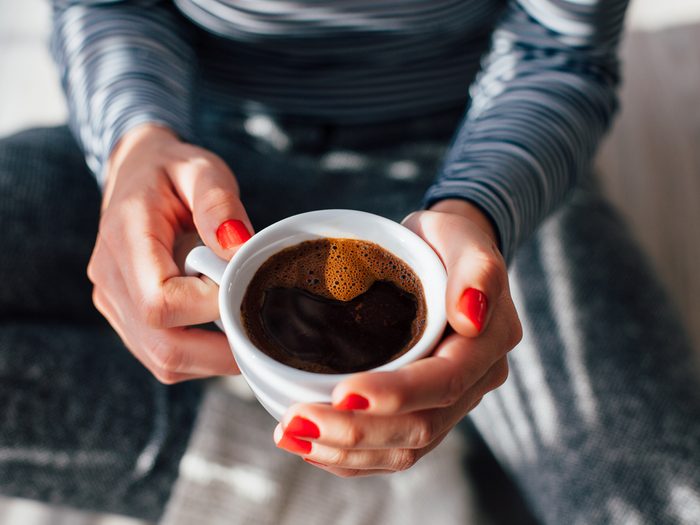
Cut down on caffeine
Since caffeine is a well-known diuretic, it’s logical to expect to move water and salt out of your body, and thus reduce bloating. But caffeine may cause dehydration, which makes your digestive system sluggish and possibly lead to blockages. We regret to inform coffee fans, but when it comes to bloat, the less caffeine the better. Here are the dos and don’ts to reduce stomach bloating.

Skip the sports drinks
Sports drinks are marketed as an alternative to soda, but unless you’re a pro athlete or exercising like one, give them a pass. These beverages are full of artificial sweeteners, extra sodium, and other salts, all of which can cause bloating. Many also have a surprising amount of calories. After you work out, replenish your fluids with plain old water or unsweetened, unflavoured coconut water.
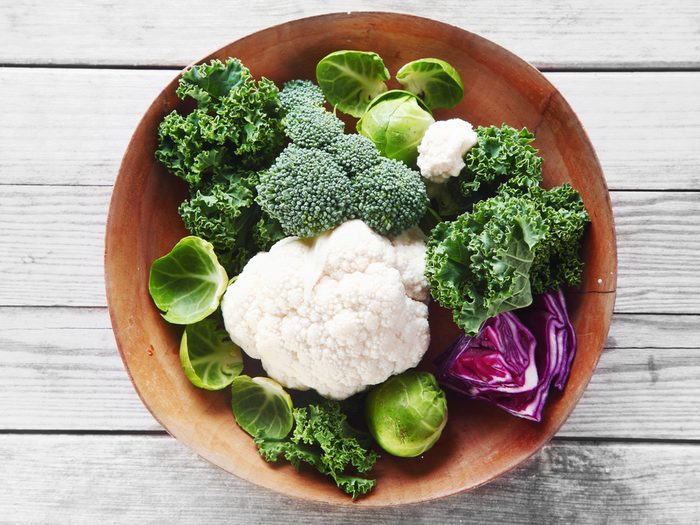
Look beyond the beans
We all know that beans cause gas, but did you know that kale, cauliflower, and broccoli contain the same gas-inducing compound, called raffinose? Because our bodies are unable to completely digest naturally occurring raffinose, the bacteria in the colon ferment it, creates stinky methane, and causes bloating. You should not eliminate these veggies from your diet since their nutritional benefits far outweigh the bloating drawbacks, but you can take Beano or Bean-zyme (they contain an enzyme that helps break down raffinose) before you’re about to consume any of them. Check out these convincing reasons fibre helps with weight loss.
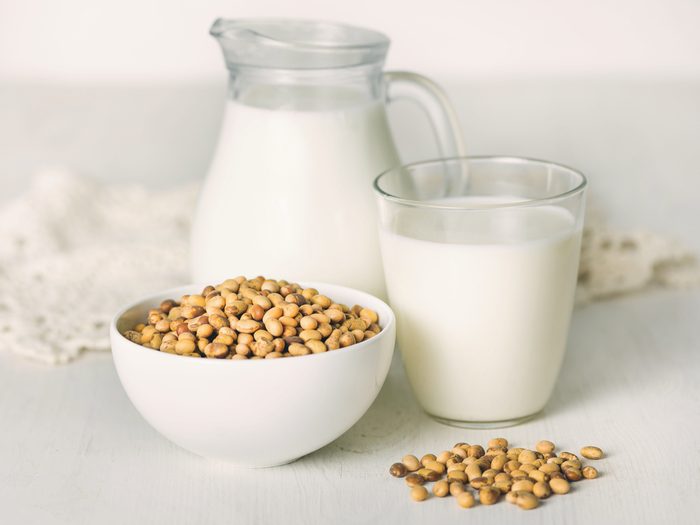
Switch out processed soy
Soy contains compounds that are chemically similar to estrogens and have estrogen-like effects, including bloating and weight gain. You should reduce the amount of processed, unfermented soy (the kind found in soy milk and soy cheese) that you consume. However, eating small amounts of unprocessed fermented soy such as miso, natto, and tempeh is okay, says Dr. Chutkan. If you’re lactose intolerant and rely on soy milk as your dairy substitute, substitute almond milk, coconut milk, or rice milk instead.
On the subject of soy, be sure to read: Should You be Adding More Soy to Your Diet?

Respect your body’s rhythms
Your body follows its own cycle, and that goes for your digestive system, too. Like your brain, your stomach is more active during the day and quieter at night. This means that the later you consume a big meal, the slower your GI tract digests it. Also, the later in the day it is, the less likely you are to be up and on your feet, allowing gravity to assist in moving your system. So shrink your meal sizes as the day goes on to reduce stomach bloating. If you want to go out to eat, go for lunch or brunch. Added bonus: These meals are usually cheaper than dinner, so you’ll save money.
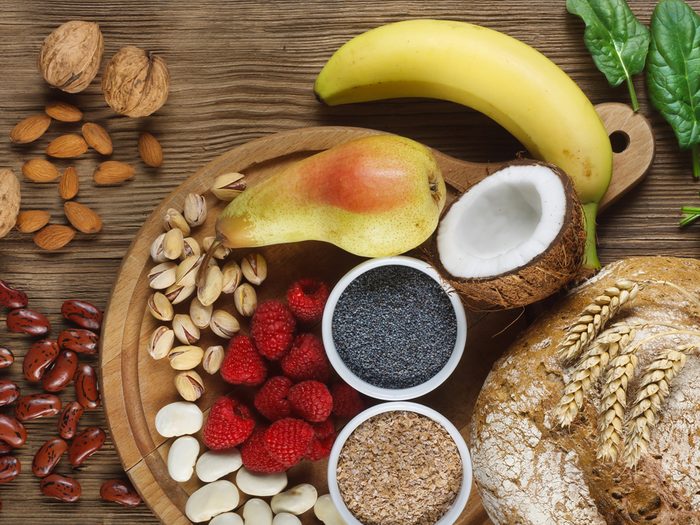
Fill up on fibre (the right way)
You probably don’t need to be told that a high-fibre diet is good for you. But what you should know is that supersize servings of fibre can sometimes block your digestive system. This is more likely to occur if your stomach and intestines are unaccustomed to such a diet or if you’re not consuming enough water to flush out your GI tract. To reduce stomach bloating, always drink plenty of water with your meals; try to ingest your fibre earlier in the day, when your stomach is most active; space it out so you don’t eat all your fibre in one meal; and take a vigorous walk after eating to trigger peristalsis, the natural movement of your gut muscles.
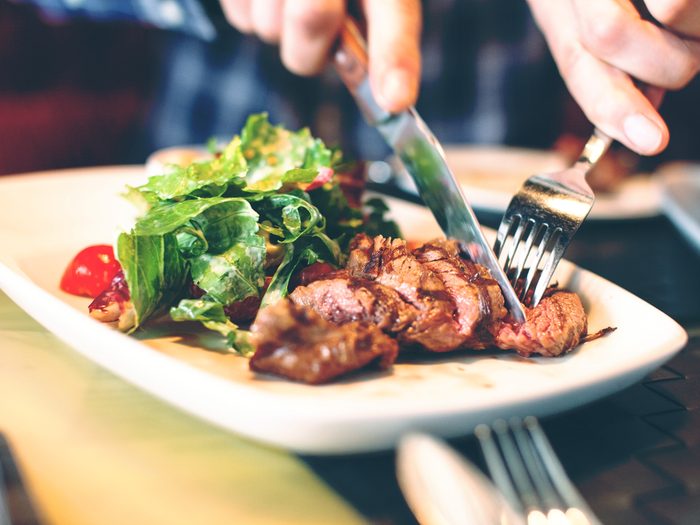
Eat measured amounts of meat
Meat takes more time for your digestive system to break down and pass through, leading to bloat. “Eating a lot of meat can expose you to unhealthy amounts of antibiotics that throw your gut bacteria out of whack and fill you with gas,” says Dr. Chutkan. Adjust your diet so that you consume no more than four ounces of animal protein a day.

Quit smoking
We’ll let Dr. Chutkan give it to you straight. “Smoking is guaranteed to add to your bloat in three important ways,” she explains. “You end up inhaling and swallowing a lot of air when you smoke; the toxins in cigarette smoke cause inflammation in the lining of your stomach and intestines, which makes you bloated and uncomfortable; and smoking kills of beneficial bacteria in your digestive tract, leading to overgrowth of bloat-causing bad bacteria.” Also, check out How Candy Crush Saga Can Help You Eat Better and Quit Smoking.
